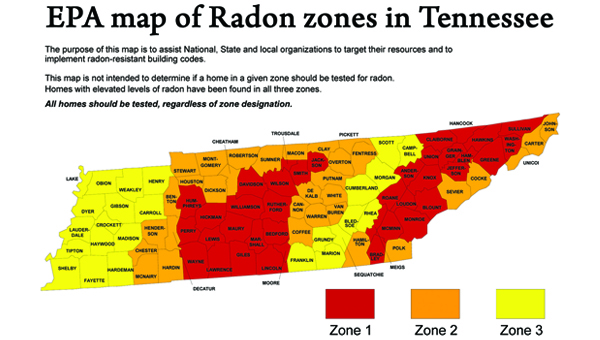TDEC: Residents should test homes for radon
Published 9:28 am Wednesday, January 21, 2015
With many people in the state living in areas prone to high levels of radon, the Tennessee Department of Environment and Conservation is helping educate the public by observing a “radon action month.”
TDEC is hoping to get the word out to residents about the danger of radon exposure, encouraging testing and how to address radon problems in your home.
“Tennessee has a particularly high level of radon in relation to other states and it has been detected in every county,” TDEC Commissioner Bob Martineau said. “Acquiring a simple do-it-yourself test kit to help determine the presence of radon is the first step to mitigation.”
Here in Northeast Tennessee, radon has been detected at high levels as well.
“The Environmental Protection Agency estimates that 70 percent of Tennessee residents are living in elevated radon areas and are at risk,” said Jan Compton, manager of the Tennessee Radon Program and manager of TDEC’s Office of Sustainable Practices, which is located in Johnson City. “Carter County is considered a high risk area because the average test for radon is higher than the EPA standard.”
The EPA recommends corrective action be taken if a test shows radon levels of 4 picocuries per liter, or pCi/L, or higher in the home.
“The average test for Carter County is coming back at 4.4 picocuries per liter,” Compton said.
As a form of radioactive gas, radon has been linked to cancer, Compton said.
“Radon is the second leading cause for lung cancer,” Compton said. “It is the leading cause for non-smokers.”
The gas is colorless and odorless, and occurs naturally in the soil, Compton said. As it breaks down in the soil, radon seeps up into homes through any opening it can find.
“No home is completely sealed,” Compton said, adding that as pipes and vents enter a home they create an opportunity for radon to seep in.
Through a grant received by the state, TDEC is currently offering free home testing kits that will allow home owners to test for radon. The kits are self-explanatory, Compton said.
The best time to test is during consistently cold weather, usually from October to March. This is the time of year when doors and windows are shut, so the test results are more representative of in-home exposure. Radon problems can be fixed by qualified contractors for a cost comparable to that of many common household repairs, such as painting or installing a new water heater.
To request a free home test kit, visit the program website at http://www.tn.gov/environment/sustainable-practices_radon-program.shtml or call 1-800-232-1139 and leave a detailed message with your name, telephone number and address, Compton said.
Radon test kits can also be purchased at most home improvement stores, Compton added.






